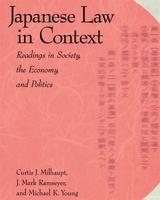
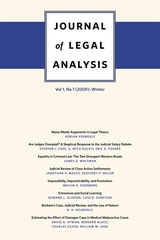
Co-published by the John M. Olin Center for Law, Economics, and Business at Harvard Law School and Harvard University Press, the JLA is a faculty-refereed, peer-reviewed publication on law. It aspires to be broad in coverage, including doctrinal legal analysis and interdisciplinary scholarship. JLA articles are free online and available for sale in bound issues.
Volume 1, Issue 1 contains contributions from Adrian Vermeule (Many-Minds Arguments in Legal Theory), Stephen J. Choi, G. Mitu Gulati, and Eric A. Posner (Are Judges Overpaid? A Skeptical Response to the Judicial Salary Debate), James Q. Whitman (Equality in Criminal Law: The Two Divergent Western Roads), Jonathan R. Macey and Geoffrey P. Miller (Judicial Review of Class Action Settlements), Melvin A. Eisenberg (Impossibility, Impracticability, and Frustration), Edward L. Glaeser, Cass R. Sunstein (Extremism and Social Learning), R. H. Helmholz (Bonham's Case, Judicial Review, and the Law of Nature), and David A. Hyman, Bernard Black, Charles Silver, and William M. Sage (Estimating the Effect of Damages Caps in Medical Malpractice Cases).
http://jla.hup.harvard.edu
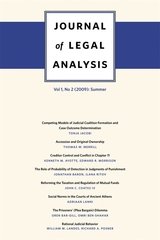
Co-published by the John M. Olin Center for Law, Economics, and Business at Harvard Law School and Harvard University Press, the JLA is a faculty-refereed, peer-reviewed publication on law. It aspires to be broad in coverage, including doctrinal legal analysis and interdisciplinary scholarship. JLA articles are free online and available for sale in bound issues.
Volume 1, Issue 2 contains contributions from Tonja Jacobi (Competing Models of Judicial Coalition Formation and Case Outcome Determination), Thomas W. Merrill (Accession and Original Ownership), Kenneth M. Ayotte and Edward R. Morrison,(Creditor Control and Conflict in Chapter 11), Jonathan Baron and Ilana Ritov (The Role of Probability of Detection in Judgments of Punishment), John C. Coates (Reforming the Taxation and Regulation of Mutual Funds: A Comparative Legal and Economic Analysis), Adriaan Lanni (Social Norms in the Courts of Ancient Athens), Oren Bar-Gill and Omri Ben-Shahar (The Prisoners' (Plea Bargain) Dilemma), and William M. Landes and Richard A. Posner (Rational Judicial Behavior: A Statistical Study).
http://jla.hup.harvard.edu
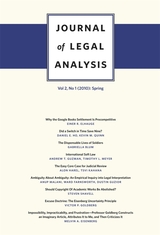
Co-published by the John M. Olin Center for Law, Economics, and Business at Harvard Law School and Harvard University Press, the JLA is a peer-reviewed publication on law. It aspires to be broad in coverage, including doctrinal legal analysis and interdisciplinary scholarship. JLA articles are free online and available for sale in bound issues.
Volume 2, Issue 1 contains contributions from Einer R. Elhauge, Daniel E. Ho, Kevin M. Quinn, Gabriella Blum, Andrew T. Guzman, Timothy L. Meyer, Alon Harel, Tsvi Kahana, Anup Malani, Ward Fransworth, Dustin Guzior, Steven Shavell, Victor P. Goldberg, and Melvin A. Eisenberg.
http://jla.hup.harvard.edu
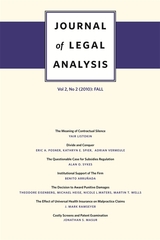
Co-published by the John M. Olin Center for Law, Economics, and Business at Harvard Law School and Harvard University Press, the JLA is a peer-reviewed publication on law. It aspires to be broad in coverage, including doctrinal legal analysis and interdisciplinary scholarship. JLA articles are free online and available for sale in bound issues.
Volume 2, Issue 2 contains contributions from Yair Listokin, Eric Posner, Kathryn Spier, Adrian Vermeule, Alan Sykes, Benito Arruñada, Theodore Eisenberg, Michael Heise, Ncole Waters & Martin Wells, J. Mark Ramseyer, and Jonathan Masur.
http://jla.hup.harvard.edu
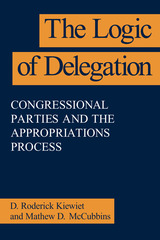
In The Logic of Delegation, however, D. Roderick Kiewiet and Mathew D. McCubbins persuasively argue that political scientists have paid far too much attention to what congressional parties can't do. The authors draw on economic and management theory to demonstrate that the effectiveness of delegation is determined not by how much authority is delegated but rather by how well it is delegated.
In the context of the appropriations process, the authors show how congressional parties employ committees, subcommittees, and executive agencies to accomplish policy goals. This innovative study will force a complete rethinking of classic issues in American politics: the "autonomy" of congressional committees; the reality of runaway federal bureaucracy; and the supposed dominance of the presidency in legislative-executive relations.
READERS
Browse our collection.
PUBLISHERS
See BiblioVault's publisher services.
STUDENT SERVICES
Files for college accessibility offices.
UChicago Accessibility Resources
home | accessibility | search | about | contact us
BiblioVault ® 2001 - 2025
The University of Chicago Press









